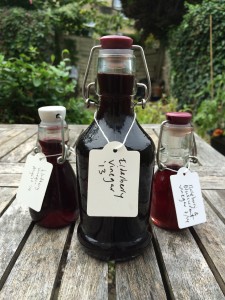These vinegars were made from allotment black currants, foraged Blackberries and Elderberries. Last September I made enough Elderberry vinegar to last through the year and it’s proved to be one of my favourite kitchen ingredients.
- Raspberry vinegar can be used to deglaze cooking pans after sautéing lamb. The delicious fruitiness lifts the caramelised flavours off the bottom – no more scrubbing sticky pans!
- Add Elderberry vinegar to olive oil for a mouthwatering salad dressing, the perfect accompaniment to all your foraged salads.
- Elderberry vinegar is also particularly good with game.
- Make a refreshing cordial by adding vinegars to iced mineral or soda water.
- Lastly, surprisingly, vinegars work a treat drizzled over vanilla ice cream.
Full of vitamins, anti-oxidants and anthrocyanins, your fruit vinegars can help keep colds at bay throughout the winter months. Vinegars still contain quite a lot of sugar – but less than things like jams, jellies and fruit leathers. Use unpasteurised apple cider vinegar in your recipes and you’ll be getting even more goodness. More or less sugar can be used according to your preference. Add the sugar to taste when you heat your vinegar before bottling. - Using less sugar means you’ll have a more vinegary tart flavour. - Adding more sugar and you’ll end up with a more syrupy consistency. Below is a basic recipe for making Elderberry vinegar which I’ve taken from Miles Irving’s excellent book The Forager Handbook. He credits the recipe to forager-herbalist Mandy Oliver. You can use the same method to make other fruit vinegars.
Elderberry vinegar recipe:
Freeze Elderberries then when you are ready to make your vinegar remove from the freezer, prizing them from their stalks using your fingers. Discard any that don’t look good.
Allow 500ml white wine or apple cider vinegar for 350g fruit. Add the vinegar to the fruit, leave covered for 3-5 days, stirring occasionally, then strain off the liquid.
Add 350g sugar per 260ml liquid, boil for 10 minutes then bottle in sterilised bottles.
You can try reducing some of the liquid for a further 10 minutes or so to make a balsamic glaze which is fantastic on deserts.

